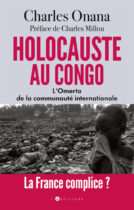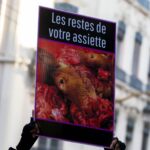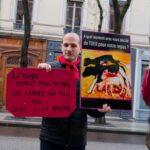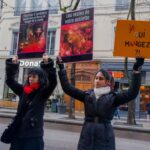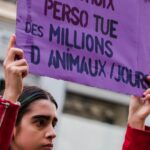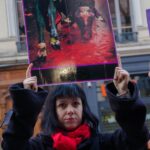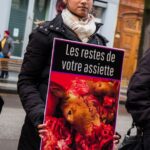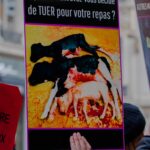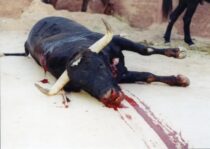Last month, during a weekend stay in Paris, I stumbled upon this particular image in the subway, prominently displayed on an ad promoting the book. The title, of course, immediately drew my attention. „Holocaust in the Congo“ provokes a strong sentiment about the topic, and coupled with a distressful photo, it immediately tells a story of a horrific tragedy. Now, I have no reason to doubt that a holocaust has indeed happened in this place, and it‘s clear why the author chose the word „holocaust“ for the title: to somehow give a name to the immensity of suffering of the people in which France was probably an accomplice (pointed at by the subtitle „La France complice?“). What I do want to point to is linguistic hypocrisy as another example of overall speciesism, which is present in all areas of our everyday life, including language and communication.
The question is: why is it alright to use the word „holocaust“ in this particular example (and others that describe human suffering) but not when we want to describe the unbelievable suffering of literally trillions of non-human animals every year – innocent, sentient beings who are enslaved, experimented on, abused, tortured, raped, mutilated and violently murdered? The immensity of their suffering cannot even be put into words, which is why the most powerful word, a word that has the most intense emotional connotation and a word that encompasses all the different horrifying things that humans do to their victims is precisely a „holocaust“. Many Jewish writers have themselves written about this.
We are all well aware that the Holocaust happened to the Jewish people during World War II at the hands of the Nazis. That doesn‘t mean that another holocaust cannot happen, and indeed, that it is not happening right now (which it is). In short, to attempt to ban the use of the most descriptive word known to mankind for non-human animals under the pretext of sensitivity, but to allow the same word to be used for human animals for the same suffering is a clear example of linguistic speciesism, that is, a discrimination in our language against other sentient beings based on their species.
Until we learn to respect others‘ rights and behave according to the moral baseline, regardless of the species, race, and other differences, we will continue to subject both human and non-human animals – to other holocausts.
Author: CursedPoet
A BOSNIAN IN FRANCE x VEGAN VIGNETTES: NATIONALITY VERSUS EMPATHY?
With the second year of me being in France firmly establishing itself in the vestibules of my mind and everyday life (it‘s been almost six months since the anniversary), the thought of a review of this emerging identity firmly established itself, as well. The dust has settled, the horizon is foggy but promising. Who am I in all this, though, now, after a while? After the proud, antagonizing presence mellowed into a kind of uncertainty?
A lot of it has to do with disappointment. Or, better put, a kind of realization: no matter what Bosnians do and are, the basic ethical principle of „do no harm“ that is fundamental to veganism and my personal view of purpose in the world is not organic to them. To us. Just like any other nation in the world, Bosnians and Herzegovinians by and large are necrovores and think it‘s okay to oppress animals. That is a stance I cannot get behind.
So, what exactly is our nationality when faced with oppression? Does it even matter? I‘d love to be able to say that my nation is enlightened and non-oppressive, but the reality is that, in regards to animals, we are no different than anyone else on the planet (exceptions nothwithstanding). The animals are still being bred into miserable and short existence, exploited, tortured, mutilated, raped and murdered for pleasure, be it taste, entertainment, clothing… That is, sadly, true for Bosnia as much as its neighboring countries, as much as the US, the UK… or France, for that matter.
One injustice does not negate another. It is also true that Bosnia and Herzegovina has been through the worst atrocities in Europe since WWII, that the Serb military forces, along with Croat military forces, performed ethnic cleansing and systematic genocide during the aggression in the 1990s, and it is true that the country and its residents are still going through a systematic negation of the cleansing and genocide by ultranationalists inside who want to tear it apart. That is a truth I will always speak loudly.
However, blindly defending everything we do and produce is not part of patriotism. For example, I will never champion a cheese company from Bosnia and Herzegovina, because that „success“ is built upon grieving mothers and their dead children. Cheese comes from milk, and milk comes from mothers – exploited mothers whose milk is stolen by humans.
In that light, patriotism can never justify an injustice. And, that is why, next to locals, there are numerous animal rights activists here who hail from different countries, different nationalities, different religions, who have all clearly seen what happens behind the doors of slaughterhouses and milk factories, regardless of where they are. Whether it is France or Bosnia and Herzegovina, we are united in one goal: the liberation of all non-human animals.
In the end, I realized that there is a way to be both: a Bosnian and an animal rights activist. After all, I was both back in my homeland, and I can be both here. Issues and uncertainties regarding what it means to defend the truth about my country here will arise in the future, I‘m sure, but my settlement so far has clearly shown me how I want to spend most of my free time: defending the most innocent beings on the planet – animals. That is one of my reasons for existence, my purpose.
I will say one more thing to my Bosnians and Herzegovinians, as well as all the people, everywhere in the world: without changing our fundamental view of non-human animals, we will collectively never be able to rise above doing harm to other, human animals. As Tolstoy has rightfully remarked: „How can we hope that peace and prosperity will reign on Earth, if our bodies are living tombs, in which murdered animals are buried?“
„As long as there are slaughterhouses there will be battlefields.“
/visual impressions from the most recent action of animal rights activists in Lyon, France, against the consumption and glorification of meat aka dead animal parts in one of Lyon’s most famous meat restaurants, April 1, 2023 – photos by Nath One Voice/
WHY FRANCE IS THE WORST EUROPEAN COUNTRY FOR ANIMAL RIGHTS
For non-human animals, all countries are bad. All „humans“ who are not vegan condone and pay for animal abuse in all the gruesome forms it exists. From meat and dairy, eggs, to leather, fur, torture for entertainment, and experimentation on animals – it is all built on a mountain of suffering, mutilation and murder.
The title, therefore, does not mean that other countries on the European continent are a safe haven for the innocent victims of human hate and desire for domination. Far from it. Yet, most other countries take strides towards the evolution of empathy, and towards a ban of the most egregious torture practices, however slow the evolution is. Germany is at the forefront of vegan food and raising awareness on the Animal Holocaust (and Berlin was just voted No. 2 on the Top 10 Vegan Cities list by HappyCow). The UK even more. Switzerland, France‘s neighbor, even had a referendum to ban factory farming! It wasn‘t banned (sadly), but more than 30% of residents voiced their opposition, and I have no doubt they will get there soon. Hell, even Bosnia and Herzegovina (my country of origin) recently witnessed its first ever vegan festival, organized in the capital city by VivaBiH, the national Vegan Association.
So, why exactly is France the worst? Surely there has been some progress here, as well?
The short answer is: no. No, there hasn‘t. Sure, it has some vegan options. Sure, there are associations raising awareness on the plight of non-human animals. But when taking into account the place of France in the grand scheme of Europe, its constant urge to become leaders on this continent in all aspects of life, including the evolution of the human thought („We are the birthplace of modern democracy!“), its representatives and the actual level of evolution are pathetic.
The core of the „French identity“ is founded on the suffering of our fellow Eathlings so much that people here take pride in the cruelty and torture they inflict upon them. Take for example foie gras: while it is illegal in several developed countries in the world, and even King Charles recently banned it from the British Royal Court, naming it “torture in a tin”, here it is celebrated and adored. People mock others who do not enjoy in an effort to portray them as simple peasants of poor palate. Let me remind my readers that this awful „delicacy“ is made by force feeding ducks and geese multiple times a day so that their liver gets sick (hepatic steatosis), after which it is eaten as a whole or ground up. The birds are confined in crates so small they cannot move. The workers shove long metal tubes down their throats, which also causes organ failure, injuries to the birds‘ beaks and throats, pneumonia. Moreover, Animal Equality notes that „the wire cages can cause foot and leg injuries, and the intense confinement is mental misery for these normally curious and sensitive animals.“ Of course, at the end of this unimaginable torture (think the „Gluttony“ murder from the movie Se7en, lasting for weeks), the poor birds are violently slaughtered. All that is foie gras.
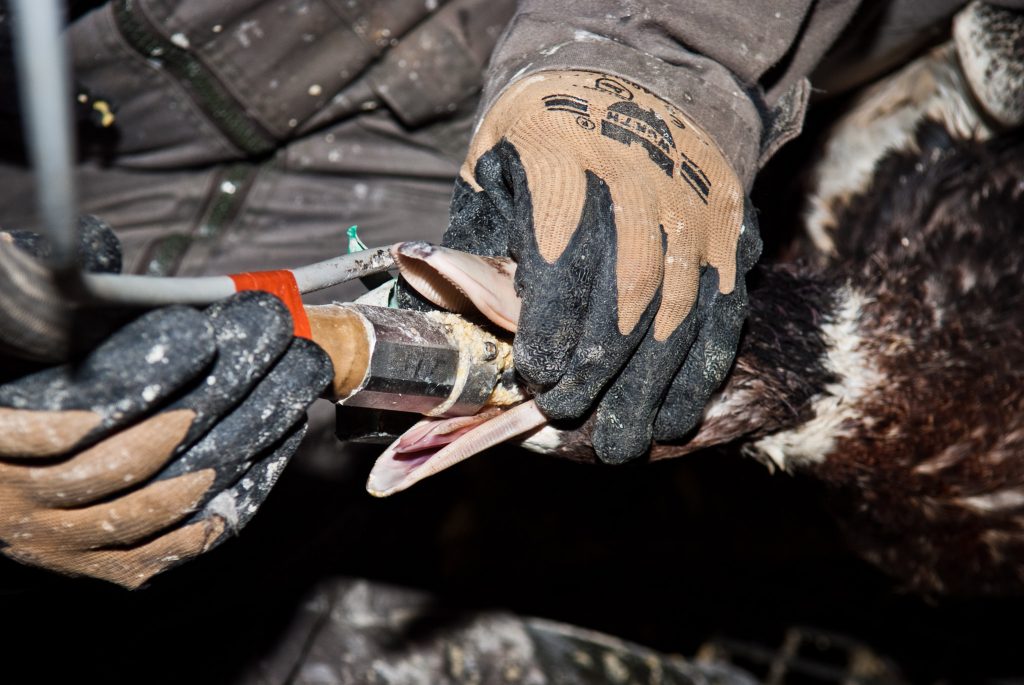
The French have made their whole identity on cruelty and torture. The more cruel the practice, the better it is for the „food“ they consume, and the „entertainment“ they watch. Who cares if bullfighting originated in Spain! They gleefully stole the practice of killing innocent animals for barbaric thrills and made it their own. Empathy is considered weak and unaristocratic, and if there‘s one thing the French desperately want to be, it‘s the aristocracy of Europe and the world. Being cruel is being sophisticated. Inventing torturous devices is being more intelligent than others who are „beneath“ them. And after literally decades of waiting for the bill to ban bullfight to arrive at the French Parliament, yesterday it was pulled from the debate. The pro-torture representatives sent over 500 ridiculous amendments to stop the ban, even though the majority of regular French citizens (77%) oppose bullfights. A stolen torture masked as the foundation of tradition and identity is defended yet again. The Dark Ages are alive and well here, and the inquisition of animals is endless.
That, ladies and gentlemen, is France. The worst European country for animal rights bar none, because it forcefully wants to superimpose the notion of nobility and culture unto hateful dominion, unto pain and unto unimaginable suffering. A country of despicable acts, of atrocious parliamentarian games, of identity smeared with blood of the innocents. A shameful land, a disgraceful identity. No culture.
I am ashamed and enraged to be here. But in the word of Banksy, „From this moment, despair ends, and tactics begin.“ With my activism, and along other activists, I will do everything in my power to usher this country into true Renaissance, one founded on empathy and liberation of all victims, regardless of the species. As Aymeric Caron, the representative who proposed the bullfight ban bill, said yesterday: „What’s just happened today, isn’t an end… but it’s just a start.“
/Image courtesy of: Animal Equality; Lisa Markkula / Peta France/

